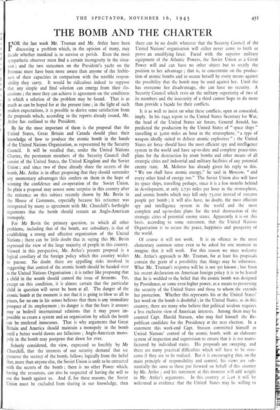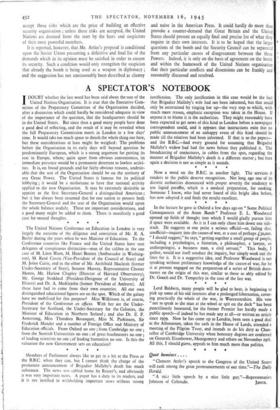THE BOMB AND THE CHARTER VOR the last week Mr.
Truman and Mr. Attlee have been I discussing a problem which, in the opinion of many, may decide whether mankind is to survive or perish. Even the most sympathetic observer must find a certain incongruity in the situa- tion; and the two statesmen on the President's yacht on the Potomac must have been more aware than anyone of the feeble- ness of their capacities in comparison with the terrible respon- sibility they carry. It would be ridiculous indeed to suppose that any simple and final solution can emerge from their dis- cussions; the most they can achieve is agreement on the conditions in which a solution of the problem may be found. That is as much as can be hoped for at the present time ; in the light of such modest expectations, it is possible to derive some satisfaction from the proposals which, according to the reports already issued, Mr. Attlee has outlined to the President.
By far the most important of them is the proposal that the United States, Great Britain and Canada should place their knowledge of how to produce the atomic bomb in the hands of the United Nations Organisation, as represented by the Security Council. It will be recalled that, under the United Nations Charter, the permanent members of the Security Council ,shall consist of the United States, the United Kingdom and the Soviet Union ; and since two of these already share the secrets of the bomb, Mr. Attlee is in effect proposing that they should surrender any momentary advantages this confers on them in the hope of winning the confidence and co-operation of the Soviet Union. So plain a proposal may arouse some surprise in this country after the reticence on this subject recently shown by Mr. Bevin in the House of Commons, especially because his reticence was interpreted by many as agreement with Mr. Churchill's forthright arguments that the bomb should remain an Anglo-American monopoly.
For Mr Bevin the primary question, to which all other problems, including that of the bomb, are subsidiary, is that of establishing a strong and effective organisation of the United Nations ; there can be little doubt that in saying this Mr. Bevin expressed the view of the .large majority of people in this country. Viewed in this perspective, Mr. Attlee's present proposal is a logical corollary of the foreign policy which this country wishes to pursue. No doubt there are appalling risks involved in suggesting that control of the atomic bomb should be handed over to the United Nations Organisation ; it is rather like proposing that a child in the womb should control the issue of firearms. Yet, except on this condition, it is almost certain that the particular child in question will never be born at all. The danger of the atomic bomb at the moment is not that it is going to blow us all to pieces, for no one in his senses believes that there is any immediate prospect of its employment ; its danger is that the fears it arouses may so bedevil international relations that it may prove im- possible to create a system and an organisation by which the bomb can be rendered innocuous. That is why arguments that Great Britain and America should maintain a monopoly in the bomb until a better world dawns are fallacious ; Anglo-American mono- poly in the bomb may postpone that dawn for ever.
Soberly considered, the view, expressed so forcibly by Mr Churchill, that the interests of our security demand that we preserve the secrecy of the bomb, follows logically from the belief that, more than anyone else, the Soviet Union is unfit to be entrusted with the secrets of the bomb ; there is no other Power which, having the resources, can also be suspected of having the will to use the bomb against us. And if, for these reasons, the Soviet Union must be excluded from sharing in our knowledge, then there can be no doubt whatever that the Security Council of the United Nations' organisation will either never come to birth or prove an unedifying farce. Faced with the superior military equipment of the Atlantic Powers, the Soviet Union as a Great Power will and can have no other object but to rectify the position to her advantage ; that is, to concentrate on the produc- tion of atomic bombs and to secure herself by every means against the possibility that the bomb may be used against her. Until she has overcome her disadvantage, she can have no security. A Security Council which rests on the military superiority of two of its members and the insecurity of a third cannot hope to do more than provide a facade for their conflicts.
It is as well to insist on what these conflicts, open or concealed, imply. In his 1945 report to the United States Secretary for War, the head of the United States .air forces, General Arnold, has predicted the production by the United States of "space ships" travelling at 3,000 miles an hour in the stratosphere, "a type of weapon ideally suited to deliver atomic explosives" ; the United States air force should have the most efficient spy and intelligence system in the world and have up-to-date and complete peace-time plans for the destruction by atom bombs and other means of all strategic cities and industrial and military facilities of any potential enemy state. M. Molotov has already given his reply to this. "We too shall have atomic energy," he said in Moscow, "and every other kind of energy too." The Soviet Union also will have its space ships, travelling perhaps, since it is a few months behind in development, at only 2,750 miles per hour in the stratosphere, and atomic bombs which may kill only 75,000 instead of ioo,o people per bomb ; it will also have, no doubt, the most efficient spy and intelligence system in the world and the most complete and up-to-date plans for the total destruction of the strategic cities of potential enemy states. Apparently it is on this basis, according to some statesmen, that the United Nations Organisation is to secure the peace, happiness and prosperity of the world.
Of course it will not work. It is an offence to the most elementary common sense even to be asked for one moment to imagine that it will work. For this reason we must welcome Mr. Attlee's approach to Mr. Truman, for at least his proposals contain the germ of a possibility that things may be otherwise. What Mr. Truman's response will be is not yet known ; but from his recent declaration on American foreign policy it is to be feared that he is wedded to the belief that the atomic bomb was designed by Providence, or some even higher power, as a means to preserving the security of the United States and those to whom she extends her protection. Whether this represents his or the United States' last word on the bomb is doubtful ; in the United States, as in this country, there are many who believe that political wisdom requires a less exclusive view of American interests. Among them may be counted Capt. Harold Stassen, who may find himself the Re- publican candidate for the Presidency at the next election. In a statement this week-end Capt. Stassen committed himself to United Nations' control of the atomic bomb, with an elaborate system of inspection and supervision to ensure that it is not manu- factured by individual states. His proposals are sweeping, and there are many practical difficulties which will have to be over- come it they are to be realised. But it is encouraging that, on the main principle of responsibility and control, his views are sub- stantially the same as those put forward on behalf of this country by Mr. Attlee ; and his statement at this moment will add weight to Mr. Attlee's arguments. In this country at :cast it will be welcomed as evidence that the United States may be willing to accept those risks which are the price of building an effective security organisation ; unless these risks are accepted, the United Nations arc doomed from the start by the fears and suspicions of their most powerful members.
It is reported, however, that Mr. Attlee's proposal is conditional upon the Soviet Union presenting a definitive and final list of the demands which in its opinion must be satisfied in order to ensure its security. Such a condition would only strengthen the suspicion that already the bomb is being used as a weapon in diplomacy ; and the suggestion has not unreasonably been described as clumsy and naive in the American Press. It could hardly do more than provoke a counter-demand that Great Britain and the United States should present an equally final and precise list of what they require in their own interests. It is to be hoped that the larger questions of the bomb and the Security Council can be separated from any particular causes of disagreement between the three •' Powers. Indeed, it is only on the basis of agreement on the bomb and within the framework of the United Nations organisation that their particular conflicts and dissensions can be frankly and reasonably discussed and resolved.































 Previous page
Previous page